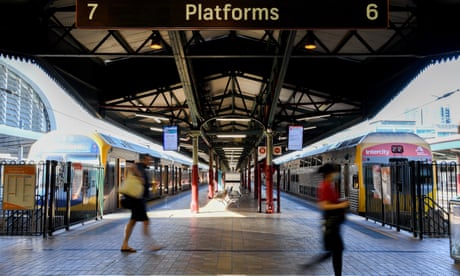- by foxnews
- 08 Apr 2025
‘Very vague’: infrastructure experts question pre-election rail promises for NSW
‘Very vague’: infrastructure experts question pre-election rail promises for NSW
- by theguardian
- 30 Mar 2022
- in news

The usefulness of interventions and upgrades proposed to the Newcastle to Sydney rail line has been questioned by infrastructure experts, noting plans from both the Coalition and Labor lack detail and realistic long-term vision.
As part of the budget, the federal government has pledged $1bn - to be matched by state government investment - to build 10km of new electrified tracks along the route, along with new rail bridges and stations between south Tuggerah and Wyong.
The government argued the improvements would allow for additional express services to bypass the slower main track and set the corridor up for faster trains and improve reliability of passenger and freight services.
The prime minister, Scott Morrison, said the infrastructure investments "will get people home sooner and safer" but federal urban infrastructure minister, Paul Fletcher, told ABC Radio the amount of time that would be saved was incalculable at this stage.
The upgrade announcement was part of the coalition's $17.9b pre-election infrastructure cash splash.
The government commitment came after opposition leader, Anthony Albanese, in January pledged a Labor government would develop a plan to deliver high speed rail between Melbourne and Brisbane.
Albanese announced an initial $500m would go towards land acquisition for the Newcastle to Sydney corridor, claiming travel times would be slashed from over two hours to 45 minutes.
Grattan Institute transport and cities director, Marion Terrill, said the Labor plan was "very vague" and she couldn't see how the Coalition's intervention would significantly improve travel times to the point of usefulness for daily commuters.
"The trip from Newcastle to Sydney is really slow. There is very difficult geography. It might shift the 160 minutes to 120 minutes with faster rail," Terrill said.
"You're not really talking daily commuters, so then who uses train if not for commuting? It's leisure passengers. People having access to the capital is important but it's a lot of money for that."
Committee for Sydney chief executive, Gabriel Metcalf, - who has been calling on the federal and state governments to work together to improve the line - welcomed the unusual "bipartisan consensus".
But he said there should be more detail from the state government on what it sees as a the long-term plan for the line.
"Corridor acquisition and incremental bits of investment along the way are fine, you've got to start somewhere, but we don't know what the alignment is going to be," Metcalf said.
"Let's take it seriously enough to actually get it done, which means approving a plan and then moving through all the subsequent stages.
"The best news is that we have a bipartisan consensus that this project needs to happen."
Head of University of Sydney's school of project management, Prof Jennifer Whyte, said the coalition's "relatively small intervention" could make a difference to travel times, but that more needed to explained about how it fitted in with the broader infrastructure plans for the state.
"Too often we think about a project as an island whereas it is an intervention into an existing system," she said.
"It's not a bad idea to do upgrades to the existing track because the cost of the overall project is so great. To find the bits which are really the bottlenecks in the network is not a bad solution."
Whyte expressed possible concern over the cost for such a short piece of track, noting the lack of publicly available information made it hard to assess the usefulness of the project.
- by foxnews
- descember 09, 2016
Ancient settlement reveals remains of 1,800-year-old dog, baffling experts: 'Preserved quite well'
Archaeologists have recently unearthed the remarkably well-preserved remains of a dog from ancient Rome, shedding light on the widespread practice of ritual sacrifice in antiquity.
read more


